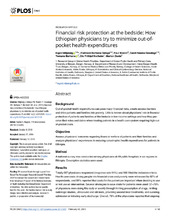| dc.contributor.author | Miljeteig, Ingrid | en_US |
| dc.contributor.author | Defaye, Frehiwot Berhane | en_US |
| dc.contributor.author | Wakim, Paul | en_US |
| dc.contributor.author | Desalegn, Dawit | en_US |
| dc.contributor.author | Berhane, Yemane | en_US |
| dc.contributor.author | Norheim, Ole Frithjof | en_US |
| dc.contributor.author | Danis, Marion | en_US |
| dc.date.accessioned | 2020-08-06T12:16:51Z | |
| dc.date.available | 2020-08-06T12:16:51Z | |
| dc.date.issued | 2019-02-12 | |
| dc.Published | Miljeteig I, Defaye FB, Wakim P, Desalegn DD, Berhane Y, Norheim OF, Danis M. Financial risk protection at the bedside: How Ethiopian physicians try to minimize out-of-pocket health expenditures. PLOS ONE. 2019;14(2):e0212129 | eng |
| dc.identifier.issn | 1932-6203 | |
| dc.identifier.uri | https://hdl.handle.net/1956/23520 | |
| dc.description.abstract | Background: Out-of-pocket health expenditures can pose major financial risks, create access-barriers and drive patients and families into poverty. Little is known about physicians’ role in financial protection of patients and families at the bedside in low-income settings and how they perceive their roles and duties when treating patients in a health care system requiring high out-of-pocket costs. Objective: Assess physicians’ concerns regarding financial welfare of patients and their families and analyze physicians’ experiences in reducing catastrophic health expenditures for patients in Ethiopia. Method: A national survey was conducted among physicians at 49 public hospitals in six regions in Ethiopia. Descriptive statistics were used. Results: Totally 587 physicians responded (response rate 91%) and 565 filled the inclusion criteria. Health care costs driving people into financial crisis and poverty were witnessed by 82% of respondants, and 88% reported that costs for the patient are important when deciding to use or not use an intervention. Several strategies to save costs for patients were used: 37–79% of physicians were doing this daily or weekly through limiting prescription of drugs, limiting radiologic studies, ultrasound and lab tests, providing second best treatments, and avoiding admission or initiating early discharge. Overall, 75% of the physicians reported that ongoing and future costs to patients influenced their decisions to a greater extent than concerns for preserving hospital resources. Conclusion: In Ethiopia, a low-income country aiming to move towards universal health coverage, physicians view themselves as both stewards of public resources, patient advocates and financial protectors of patients and their families. Their high concern for family welfare should be acknowledged and the economic and ethical implications of this practice must be further explored. | en_US |
| dc.language.iso | eng | eng |
| dc.publisher | PLoS | eng |
| dc.rights | Attribution CC BY | eng |
| dc.rights.uri | http://creativecommons.org/licenses/by/4.0/ | eng |
| dc.title | Financial risk protection at the bedside: How Ethiopian physicians try to minimize out-of-pocket health expenditures | en_US |
| dc.type | Peer reviewed | |
| dc.type | Journal article | |
| dc.date.updated | 2020-02-01T13:55:57Z | |
| dc.description.version | publishedVersion | en_US |
| dc.rights.holder | Copyright 2019 The Authors | |
| dc.identifier.doi | https://doi.org/10.1371/journal.pone.0212129 | |
| dc.identifier.cristin | 1712603 | |
| dc.source.journal | PLoS ONE | |

